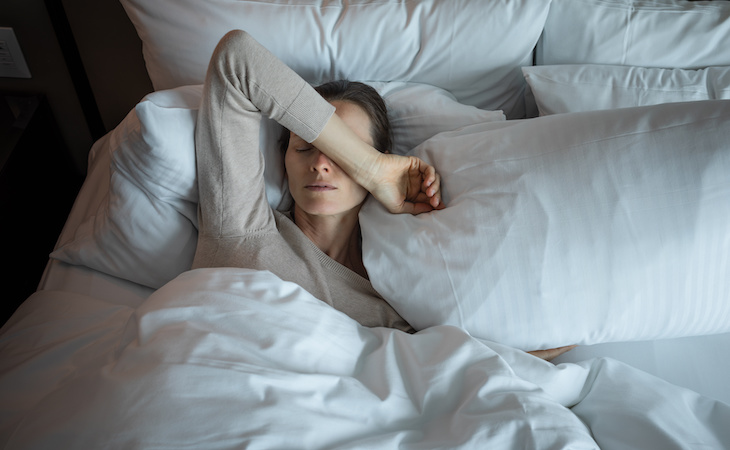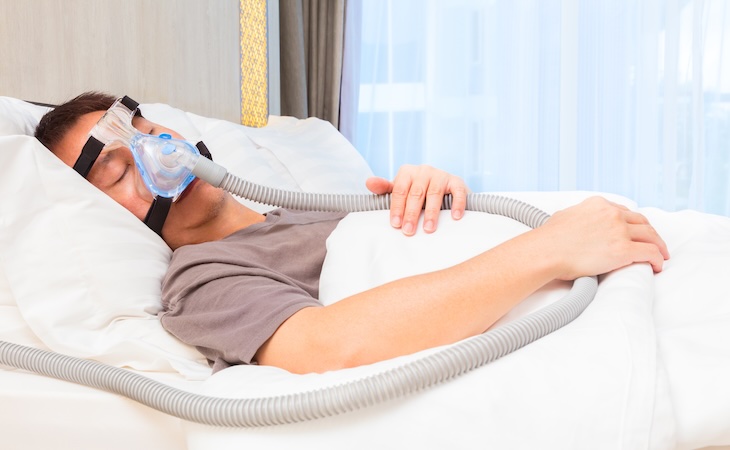Sleep talking is a phenomenon that’s fairly common. You may have noticed a partner talking in their sleep at night, or maybe they mentioned hearing you.
Below, we’re digging into all things sleep talking—why do people sleep talk, whether you should be concerned, and what you can do to keep nighttime convos under control.
What is sleep talking?
Sleep talking is a type of parasomnia (an abnormal behavior that takes place during sleep) that happens during specific parts of the sleep cycle. It can occur during both rapid eye movement (REM) sleep and non-REM sleep.
Non-REM sleep has three stages, including deep sleep; REM sleep happens about an hour after you fall asleep and is when you normally have vivid dreams. You cycle through both of these stages as you sleep.
What are the symptoms of sleep talking?
Sleep talking is characterized by audible expressions during sleep without the person being aware they’re doing it. It’s usually incomprehensible. One study looked at 232 subjects who had 883 sleep talking episodes—59% of those episodes consisted of nonverbal utterances such as shouts, whispers, or laughs.
Other times, people might speak eloquent sentences or use profanity. Some sleep talkers seem to talk to themselves while others sound as if they’re carrying on a conversation.
Episodes of sleep talking are generally short. Most sleep talkers speak for no longer than 30 seconds an episode. The sleep talker might say a few sentences or a handful of words.
Although experts are still researching this topic, there’s a chance sleep talking could be related to the content of the speaker’s dreams. This is called dream-enacting behavior (DE behavior) and refers to a person acting out the contents of their dreams. (Learn about hypnic jerks and how to treat them.)
How common is sleep talking?
Sleep talking is more common than you might think. Research shows up to 66% of people have sleep talked at one point or another.
Typically, sleep talking is more common in children—in fact, it’s reported in 50% of young children. If you’ve experienced sleep talking at any point in your life, you certainly aren’t alone.
What causes sleep talking?
Why do people sleep talk? While experts aren’t completely sure what causes sleep talking, they think there may be a genetic component. One study found that parasomnias such as sleep talking seem to share a common genetic background. It’s likely that stress, daytime fatigue, and alcohol and drugs can also play a role.
What’s more, sleep talking occurs more frequently in people who have mental health conditions, especially PTSD. Another study found psychiatric comorbidities are twice as common in people who experience frequent sleep talking. (Learn about the most common causes of yawning.)
Is sleep talking dangerous?
Sleep talking itself is usually harmless. However, in some situations, it might be a sign of a more serious sleep disorder or health condition. Sleep talking might be an issue you should look into if:
- Sleep talking interrupts a partner’s sleep, leading to a partner having insomnia
- Sleep talking happens alongside other parasomnias, which may be signs of a deeper issue
- The contents of sleep talking are embarrassing, leading to stress between the sleep talker and partner
Your primary care physician can answer any questions you have. If they think your sleep talking indicates a deeper problem, then you might need to see a sleep doctor or neurologist.
Can you stop talking in your sleep?
Since we know so little about the cause of sleep talking, there aren’t any proven methods to help you stop. But working to improve your sleep hygiene might help curb unwanted nighttime chatter. You can improve your sleep habits by:
- Sticking to a consistent sleep schedule
- Avoiding caffeine and alcohol in the afternoon and evening
- Shutting off screens before bed
- Adding relaxing activities to your nighttime routine
- Getting a comfortable mattress
- Keeping your bedroom quiet and dark
- Exercising in the morning
- Not napping during the day
What to do if your partner sleep talks
Often, sleep talking disturbs the talker’s partner more than it does the talker! If your partner talks in their sleep, your own Z’s are likely interrupted. Try these ideas to prevent your partner from disrupting your sleep:
- Wear earplugs
- Use a white noise machine
- Encourage your partner to improve their sleep hygiene
The bottom line: Sleep talking is fairly common, and although experts aren’t completely sure why some people talk in their sleep, in most cases it’s not a big deal. By working to improve your overall quality of sleep, you should be able to keep the talking in the daytime where it belongs.
Narcolepsy is a serious sleep disorder that can be difficult to diagnose. Read our guide to narcolepsy to learn more about it.




